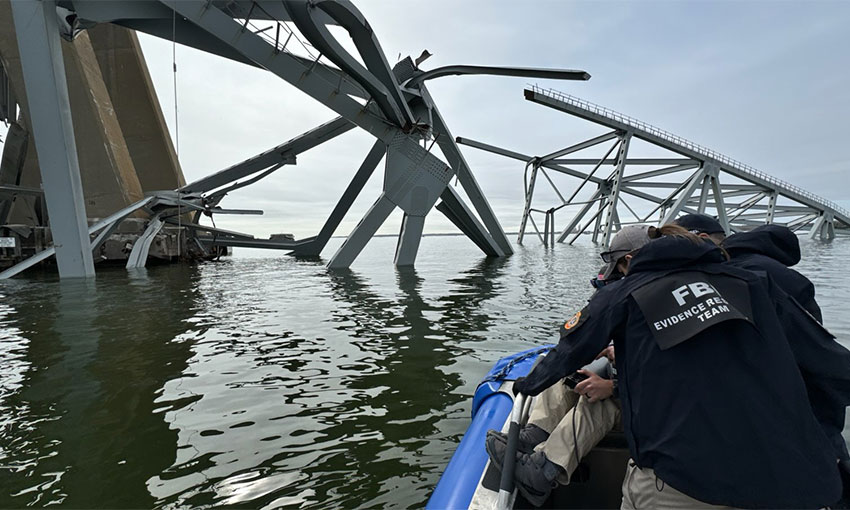WHILE US President Joe Biden has pledged the port of Baltimore will be re-opened by the end of May, new sonar images have revealed major sections of the Francis Scott Key Bridge have sunk deep in mud 50 feet below the surface of the Patapsco River.
The Army Corps of Engineers’ plan is to re-open the main channel at a temporary depth of 35 feet but spokesperson Col. Estee Pinchasin told a media conference: “Surveys are indicating the wreckage on the bottom of the 50-foot channel is far more extensive than we could have imagined. It’s not just sitting on the seabed, it’s actually below the mud line. That makes it very difficult to know where to cut and how to cut, and how to rig and lift.”
The bridge collapsed on March 26 after being struck by the powerless containership Dali, which remains pinned to the riverbed by parts of the bridge span that fell across the ship’s bow. It was reported overnight that representatives of the ship’s builder, Hyundai, have been investigating engine room electrical systems as a possible cause of Dali’s blackout shortly after departing a local terminal on a voyage to Colombo.
Analysts this week said the Baltimore blockade didn’t appear to have had any noticeable effects on freight rates despite the disruption it is causing to direct callers and to other ports dealing with diverted cargo.
Notwithstanding, the Federal Maritime Commission has issued a warning to shipping lines and terminals not to use the Baltimore situation as a cover for misbehaviour.
“Disruption to regular service at the Port of Baltimore is causing many shippers to adjust supply chain operations,” the FMC said.
“Regulated entities are reminded that all statutes administered by the Commission remain in effect. Common carriers and marine terminal operators (MTOs) must continue to comply with all statutory and regulatory requirements governing their operations.
“Demurrage and detention fees must be reasonable. FMC regulations require demurrage and detention fees meet a reasonableness test of whether the charges serve as legitimate financial incentives to encourage cargo movement.
“Demurrage and detention invoicing must be lawful. The Ocean Shipping Reform Act of 2022 (OSRA 2022) established new requirements for how demurrage and detention bills must be invoiced, including transparency on how the fees were calculated and contact information on how to request a waiver. Those requirements have been in effect since June 16, 2022. The Commission issued a final rule on February 26, 2024, that further interprets and implements the billing provisions of OSRA 2022. The new rule is scheduled to go into effect on May 28, 2024.
“Individuals or entities with concerns about common carrier or MTO compliance can seek FMC assistance.”





